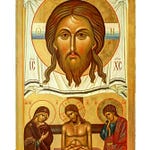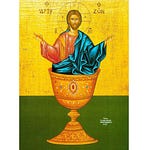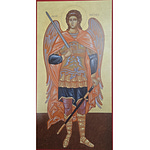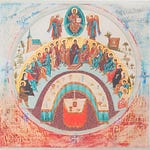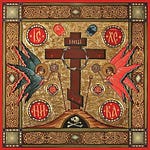When the Lord and Saviour was born in Bethlehem, as the sacred history of the Gospel bears witness, the angel of the Lord appeared with a great light to shepherds who were watching and keeping watch by night over their flocks, and declared to the world that the Sun of justice had arisen, not only by the voice in heavenly utterance, but also by the brightness of the divine light. We should know that nowhere in the whole course of Old Testament Scripture do we find that angels appeared with light, though they frequently appeared to human beings; but this privilege was properly kept for this day, when “unto the godly there ariseth up light in the darkness; the Lord is merciful, loving, and righteous” (Ps 112.4). But so that the authority of a single angel should seem small, after one angel taught the mystery of the new birth, at once there was present a multitude of the heavenly host, who sang “Glory to God on high,” even as they proclaimed peace to human beings. The angelic choir clearly demonstrates that through this Nativity human beings were to be directed toward the peace of one faith, hope, and love, and to the glory of divine praise.
Saint Luke records that “when the angels went away from them into heaven, the shepherds said to one another, ‘Let us go over to Bethlehem and see this thing that has happened.’ And, Saint Luke adds, ‘they went with haste and found Mary and Joseph, and the baby lying in a manger.’” The shepherds hastened with happy joy to see what they had heard about, and because they sought it with a burning love, they were worthy to find immediately the Saviour Whom they sought. By their words as well as their deeds, they showed the future shepherds of spiritual flocks (that is, bishops and priests) and, moreover, all faithful Christians, with what diligence of mind they too ought to be seeking Christ. “Let us go over,” it is as if they said, “to Bethlehem, and see this Word which has come to be.”
Let us also, therefore, my beloved brothers and sisters, go over in thought to Bethlehem, the city of David, and let us also recall it with love; let us celebrate Christ’s Nativity according to the flesh. Having cast aside fleshly concupiscence, they us go over with the whole desire of our mind to the heavenly Bethlehem, that is, the house of living bread, not made by hands but eternal in heaven, and let us lovingly recall that the Word which was made flesh has ascended in the flesh to where He sits at the Right Hand of God the Father. Let us follow Him to that place with the whole urgency of our virtues, and let us take care that we may deserve to see reigning in His Father’s chair the One they saw crying in the manger.
“And they went with haste and found Mary and Joseph, and the baby lying in a manger,” Luke tells us. The shepherds came hurrying and found God born as a human being, and at the same time they found those who were ministering to His Nativity. We also should hurry, my brothers and sisters, not by steps of our feet, but by progress in good works, to see this same glorified humanity with these same ministers. Let us hurry to see Him shining in divine majesty, which is the Father’s and His own. Let us hurry, I say, for such blessedness is not to be sought with idleness and sluggishness, but Christ’s footsteps must be followed briskly. Let us follow more quickly with the steps of virtues so that we may be worthy to walk in His ways.
When the Shepherds saw the Holy Child shining in divine splendor, and those ministering to Him, they made known the Word that had been told them concerning this Child. All who heard the Word wondered at what they heard, and who they heard it from. Then Luke tells us, “But Mary treasured up all these things, pondering them in her heart.” Mary wished to divulge to no one the secret things which she knew about Christ, but she reverently waited for the time and place when He, her Son, would wish to divulge them. However, although her mouth was silent, in her careful, watchful heart she weighed these secret things.
Indeed, she weighed those acts which she saw in relation to those things which she had read were to be done. She saw that herself, who had arisen from the stock of Jesse, had conceived God’s Son of the Holy Spirit. She had read in the prophet Isaiah, “There shall come forth a shoot from the stump of Jesse, and a branch from his roots shall bear fruit. And the Spirit of the Lord shall rest upon him.” She had read in Micah, “But you, O Bethlehem Ephrathah, who are too little to be among the clans of Judah, from you shall come forth for me one who is to be ruler in Israel, whose coming forth is from of old, from ancient days.” She saw that she had given birth in Bethlehem to the Ruler of Israel, Who was born eternal from the Father, God before the ages. She saw that she had “conceived as a virgin, and given birth to a Son, and called His Name Jesus.” She had read, “Behold, the virgin shall conceive and bear a son, and shall call his name Immanuel.” She had read, “The ox knows its owner, and the donkey its master's crib.” She saw the Lord lying in a manger, where an ox and an ass used to come to be nourished. She remembered that it had been said to her by the angel “The Holy Spirit will come upon you, and the power of the Most High will overshadow you; therefore the child to be born will be called holy—the Son of God.” She had read that the manner of His Nativity could be recognized only by the revelation of an angel, in accordance with Isaiah’s saying, “Who will tell of his generation?” She had read in Micah, “And you, O tower of the flock, hill of the daughter of Zion, to you shall it come, the former dominion shall come, kingship for the daughter of Jerusalem.” She knew that the Lord had come in the flesh, Whose power is one and eternal with the Father, and He would give to His daughter the Church the kingdom of heavenly Jerusalem. Mary was pondering these things which she had read were to occur with those which she recognized as already having occurred, and she kept them in her heart.
Finally, Luke records, the shepherds returned, glorifying and praising God for all they had heard and seen, as it had been told them. So let us learn, my beloved brothers and sisters, how to be turned from contemplation of the Lord’s most benevolent divinely-arranged plan, by which He deigned to come to our aid, to giving thanks always from His kindnesses. For if they, who as yet only knew about His Nativity, went back glorifying and praising God in everything which they had seen and heard, we who know about the whole progress of His Incarnation in succession, and who are imbued with the Sacraments of His Life, are all the more obliged to proclaim His glory and praise in everything, not only in words but also in deeds, and never to forget that the reason why God was born as a human being was so that He might restore us through our being born anew to the image and likeness of His divinity.
The reason He was baptized with water was so that He might make the flowing of all waters fruitful for the cleansing of our wicked deeds. The reason He was tempted in the desert was so that by being victorious over the temper He might bestow upon us knowledge and power to make us victorious through Him. The reason He died was so that He might destroy the sovereignty of death. The reason He rose and ascended to heaven was so that He might present to us a hope and an example of rising from the dead and reigning perpetually in heaven. Having “gone back” to gaze upon His most benevolent divinely-arranged plan, let us for the sake of each of these actions glorify and praise God Himself, and our Lord Jesus Christ, Who lives and reigns with the Father in the unity of the Holy Ghost, ever one God, world without end. Amen.
(adapted from Gospel Homily I.vii of the Venerable S. Bede)



